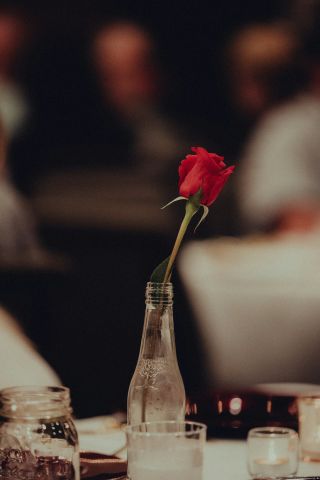Mating
The One Place to Find Romance This Valentine's Day
People are indulging in romance, but not in real life.
Posted February 5, 2024 Reviewed by Gary Drevitch
Key points
- Many people see modern dating and relationships as lacking romance.
- Romance narratives are becoming increasingly popular on TV and in books as people seek connection.
- People may have unrealistic or unhelpful lessons from internalizing the traditional romance story arc.

There is a resurgence in romance. You’ve probably noticed how social media is flooded with romantic comedies, romance novels, and obsessions with the latest celebrity or influencer couple. Sure, people still love a good murder mystery, but there is a notable increase in traditionally romantic stories of two people overcoming barriers (external ones or, more often, their own internal struggles) to be together. We love seeing the couple get torn apart, knowing that they will come back together and have their happy ending.
I’m not against it; as a couples therapist, I absolutely love love. I love romance, gestures both big and small, and unfiltered expressions of affection. (Even more than that, I love secure attachments, good communication, and strong conflict-resolution skills.) But I am curious about this cultural trend, especially in the context of how unromantic people’s love lives have become.
Starting a Relationship Is Hard
Years ago, I wrote my dissertation on how hookup culture might impact young adults’ ability to form long-term relationships. To really distill down the findings, participants reported a high sense of power but low sense of relatedness. Put in other terms, they felt empowered by getting to choose partners and freely engage in sexual acts, but they also felt emotionally disconnected and unfulfilled. This makes sense; hooking up with someone without expectations is freeing but doesn’t lead to emotional closeness.
Fast forward to the rise of dating apps, where I’d guess the findings would be similar. People feel the power—they can swipe left or right, choose to reject, or hope to match—and they are in control. But then come the opening lines, the pointless small talk that fizzles out, or the extensive talking that suddenly ends without a date, and people are left feeling alone and disconnected. They have the power to choose anyone they want, but they don’t feel emotionally close to those people.
The truth is, modern dating is rough. It’s a lot of wasted time and wasted effort. It’s a lot of feeling very unspecial when all you want is to find someone who makes you feel the opposite of that. It’s dehumanizing and demoralizing to be reduced to a few pictures, sentences, and stats.
Enter: The Romance Fantasy
In lieu of finding romance in their everyday lives, people are turning to fiction. We are watching impossibly cute and coincidental couples find each other on the silver screen, or we are reading classic romance narratives that fulfill every fantasy of what we hope finding love will be like. (We can thank BookTok for lowering the stigma of indulging in romance novels). We scroll through influencer couples' adorable reels, seeing how fun, affectionate, and happy they are, and thinking that if we see it on Instagram, it must be attainable for us too, right?
The problem is, these fantasies and social media representations are just that: fiction. These are beautiful stories with happy endings, and any unhappy parts are just for dramatic tension or comedic relief. We don’t see our own romantic lives represented in these stories; we see what we wish our romantic lives were.
The Internalization of the Fantasy
I started this page because I realized that a central way people are learning about what a good relationship looks like is through what they watch on the screen. As our dating lives become more rote and discouraging, and we stay home more thanks to technology—kickstarted by the pandemic—it makes sense that we turn to the television (or phone) to watch couples meet, date, and marry.
The problem is that many of these examples are teaching the wrong lessons, and setting up impossible or inaccurate expectations of what healthy love looks like. The romantic narrative is beautiful but feels unattainable. Or, looking at the darker side, we watch reality television normalize emotional abuse and elevate drama over love, making us think that love and passion require suffering.
At some level, whatever we watch or read, we internalize, especially if there are repeated messages such as the romance fantasy of rom-coms or the overly dramatic moments of reality television. People are unconsciously learning the wrong lessons, which directly translate into how they approach their own dating or relationship lives.

The Solution: Rethinking Romance
Most people agree that modern dating isn't working. It’s not fun (and often not successful), and it causes emotional fatigue that’s discouraging people from continuing to look for a partner. Thus the resurgence of matchmaking companies, hoping to remove that fatigue by doing the legwork for pairing people up. I think a lot of people would agree that modern relationships are also hard (Esther Perel is with me on this) due to new pressures and expectations couples feel from each other.
So where does that leave people? Dating is hard, being in a relationship is hard, yet people are yearning for connection and, dare I say it, romance, and it feels like the only place they can find it right now is through a book or a screen.
We need to find new ways to meet and marry. Technology is convenient and efficient, but it’s not romantic. Notice how none (or almost none) of the romances you love start from two people sitting at home on a Thursday night, drinking beer in their pajamas, swiping through pictures on an app until they match someone? That story isn’t a good meet-cute, and you can see why.
Valentine’s Day is around the corner. People have strong feelings about the day, but it can serve as a reminder that humans are hardwired for connection. In modern society, it’s becoming harder and harder to find that connection, and so we need an overhaul of how (and where) we find romance.




